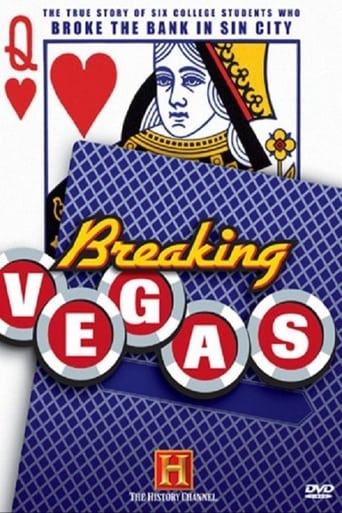welshNick
True story about how a blackjack team from MIT tried to beat the system in Las Vegas. This is far far better than the film 21 that came out and the story is told by the people who took part particularly Semyon Dukach. The casinos, after realising that they had a team of experts playing blackjack as a team start fighting back. Griffin investigations are called in and the casinos slowly put the pieces together and realise that they have MIT's best mathematical brains working against them. Gradually the team gets rounded up and barred from all the casinos not only in Las Vegas but worldwide. A thoroughly entertaining documentary that delves into the theory of card counting without getting too technical. Its all based on probability but as anyone knows, sometimes it can all go wrong even if the odds are stacked in your favour. I have card counted myself with reasonable success for small stakes and it does work despite what other posters have written.
rmbarge
Really a pretty good dramatic recreation of the popular MIT blackjack team. It tells the story without adding a lot of unnecessary dramatics -- the documentary style really suits the subject matter. The actors were quite good and the pacing and editing skillful for such a limited budget film.The shortcoming of the movie is that not enough substantive mathematics is explained. I doubt the counting method shown was the one actually used by the players, as there are much more powerful methods that are very nearly as easy to use, such as "red 7". Also, they didn't flesh out the mysterious "other techniques" used.The comment saying that their system could be "gamed" is ignorant. The entire basis of counting cards and changing bets when the count is favorable effectively changes the odds in favor of the player. I'm not sure what "gamed" means, exactly. If it means the casinos cheated, well, I highly doubt it -- if they got caught, it would cost them many hundreds of times more than any counting team could take.
sdya
There is no man-made system that can't be gamed, MIT guys figured out the sequential game methods to win in the beginning, once they were hot, their tricks became a system for casino to make game on, then they lost. What makes you think that the house never cheats?Computer simulation proves nothing, unless you send a robot to the table w/o being detected, cause we are human with mental and physical limits, and more important, human makes mistakes.Gaming industry employs so many actuaries (consider it as alternative Ph.D. in applied mathematics), same as the insurance industry. These are the people getting paid to crunch the numbers to make sure the whole deal favors the house, including all the rules. The same idea of the Law of large numbers says: the house always has better probabilities (odds), therefore, in very long run, the house will never lost.Basically, MIT team follows the doctrine that if you have a good hand, you bet Big to beat the house. All the ricks they developed were based on study of probabilities, and sequential game concepts. However, the house still has the advantages to beat this tactic: a. house only shows the chips, while players must bring in cash, this inequality means the cash from players could not be infinite, and the house always seems to have much deeper pocket, as long as it has billions of chips, then the word 'Big' is never big enough; b. almost all tables in the world have limits, even if you see the 1 of billion chance to bet big, the table limit restricts you to maximize the return, c. like one of the scene, the law also favors the house, that after you lose more than 30k, if you still want to put up more cash, you'd have to show IDs ... that's kinda of restriction bans you from turning around the bad distribution, in terms of statistics.Combination of the facts suggests: the house always appears to be more resourceful than players, thus with much longer endurance; no mater what mathematical theory, the restrictions on resource and the rules determines the final outcomes; all MIT tricks are based on mathematics and statistics, hence, with much restrictions on resource and rules, one can not even afford a bad distribution of the opportunities - I was amused to hear the complaint about 'Bad Luck' in the last a few months - Luck is not kind of the words that come out from mathematicians, least actuary won't whine as such. I'd rather consider their lost was not Bad Luck, neither Bad Distribution, it'd be as simple as the fact that the casino discovered MIT tricks, and gamed on them - eventually, MIT's counting tricks only directed them into traps instead of gold mines...Repeat again: There is no man-made system that can't be gamed !
RNHunter
This program claims to be a true story of MIT students making money at Las Vegas playing blackjack. I believe that this story is not only true as it claims, but is in fact, well done. For those that have ever thought of gambling as a profession, this is a must see movie.I have myself mathematically simulated the game of blackjack, using computers to play many billions of hands. The experiences shown during this movie are quite realistic.SPOILER ALERTI will not give away exactly what happens, but this movie covers the good news and the bad news of trying to win at gambling. You can make your own decision from it. My advice of it and the general subject is "neat, but don't quit your day job".


